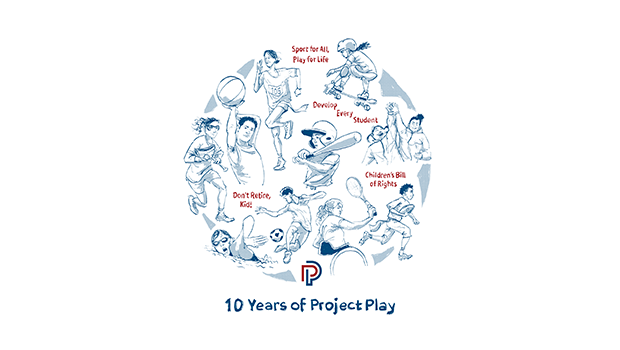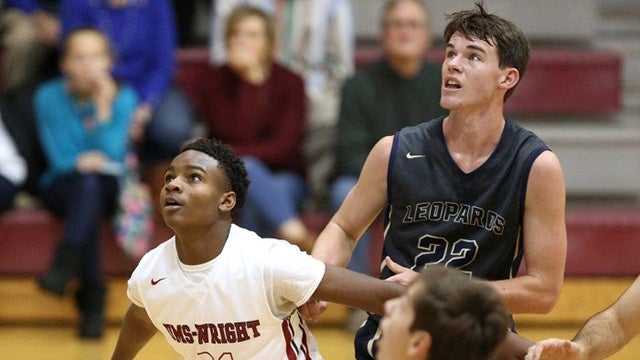At the Aspen Institute’s Project Play Summit on May 17, 2016, First Lady Michelle Obama sat down with her brother and former college basketball coach Craig Robinson, as well as ESPN show co-host Michael Wilbon to explore an important question: How to make sport accessible and affordable for all youth – regardless of zip code or ability? Her comments amount to a call to action for the sports industry and other stakeholder groups to provide quality opportunities for every child. Included below are excerpts from Obama’s remarks.
Michelle Obama on how her father, Fraser, inspired her to develop an athletic lifestyle:
Our father got us engaged in [sports]. And one of the things — Craig and I, we don’t take for granted activity, physical movement, because we know that when you have the blessing of being able to walk and run, you don’t take it for granted.
On how Title IX changed the athletic landscape for many girls and young women:
There weren’t co-ed basketball leagues in our neighborhood. There weren’t girls’ leagues. I played softball, loved to play softball, but there were really no girls’ teams. So I spent a lot of time as a spectator because the opportunities weren’t there. So that’s something that we have to really think of. Now, Title IX has changed this so dramatically, and we’re fortunate. And if you live in the right neighborhood, like our girls, you have access to a whole range of sports.
On why education about healthy habits is important for parents:
We need to start an education process. Because everybody wants to do the best thing for their kids. But if they don’t have the information and they think they’re doing the right thing when it’s absolutely the opposite of the right thing, how will we fix it?
So what I’m spending time doing is working and going around and talking about that in hopes that we as parents embrace this fact: We have these children. We have to keep them active. Nobody is going to keep them active for us.
On why impromptu play sessions outside aren’t as common anymore:
And that’s where the dilemma comes in — either you can’t play outside because it’s unsafe, or you’re the only kid playing outside because everybody else is over-specialized, right? So you’re taking them out of the mix of even just having a regular play life…. So you’ve got parents now who have a great athlete, and they’ll be like, you can only play basketball because I don’t want you to get injured playing touch football. They become a commodity, and then they don’t even have the concept of play.
On why recess is still important:
There’s a lot of things we can do to put [playing] back in — number one, making sure kids have recess at school. That’s where they’re spending most of their time. That is just as important as math and science to kids. If you’re a teacher and you’re working with boys in particular, they can’t sit still for an entire school day. They can’t physically do it… So how are we expecting them to be successful academically if the other part of their brain, that part that is movement and music and creativity, is not being exercised?
On why it’s important for companies and cities to be invested in the future of play:
So it becomes even more critical for the big sports companies to be those facilitators of those activities. Because if you look at it from a business standpoint, where is your fan base going to come from? If you’ve got girls who’ve never see sports, if you’ve got kids who’ve never touched a basketball, who are you recruiting? And who’s going to watch the Olympics if kids don’t know what half these sports are?… So if we’ve taken it out of the schools and we don’t value it, then it is going to be absolutely imperative for corporate America to go into these schools and put some gym and some sports back in.
On examples of programs that get kids active:
We have Let’s Move! in schools, where Nike is working to help teachers think of creative ways to put movement back into the school day. You’ve got a lot of corporations that are already sponsoring some really good initiatives. They’ve found how important sports can be in community policing in South Central L.A. You’ve got police officers who are setting up football leagues, and they’re redeveloping whole relationships between law enforcement and kids in those communities.
On the investment necessary to encourage sports and recreation:
Well, at some point, it’s going to require an investment. So the question is, where do you make that investment? In the past, we made the investment in school, because everybody went to school or goes to school. So that was the easiest place — recess, gym, sports in school. That costs money. We hit a wall, so we stopped investing.
So whatever the dollar figure is, as a society, as taxpayers and as corporate America — we should figure out how much that costs, and then pay for it. Period.
So then the next level of investment comes in youth centers, sports clubs. But again, that’s an investment because you’ve got to have places with gyms, and you’ve got to hire staff, you’ve got to have equipment, you have to — so if you look to the Boys and Girls Clubs, or youth leagues, that still requires and investment.
So at some level, we have to kind of ask ourselves how much are we willing to invest in the kids in our society? Because at some point, we’ve got to make that investment, even if it’s an investment in better parks in every community, creating safe spaces where kids can go out to play.
So many communities are becoming play deserts… But in wealthy communities, there is a wealth of resources. You can be in field hockey, or you can learn how to swim. There are aquatic centers and — I’ve seen the difference. The disparities are amazing to me. So are we saying that some kids are worthy of that investment in physical activity, and then there are millions of others who aren’t? And what’s the role that we as a society have for making sure that kids have equal access?
On the importance of children having opportunities to play:
But this has to become a priority in our society… This affects all of us. Play and nutrition and overall investment in our kids — whether they can read and think and engage — it’s just not enough for us to be okay with so many kids not having that at an excellent level. So whatever the dollar figure is, as a society, as taxpayers and as corporate America — we should figure out how much that costs, and then pay for it. Period.
The Aspen Institute’s Project Play is a multi-stage effort to provide stakeholders with the thought leadership to help sport build healthy communities, starting with access to quality sport activity for all children.

